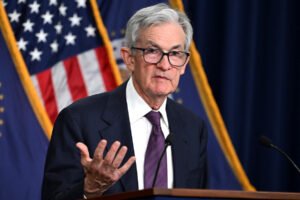This has been a summer where big tech has largely showered us with huge earnings, bigger estimates of their capital spending and fairly fantastic stock gains.
Palantir Technologies (PLTR) , for example, may have finished the week down 5.24%, but the big data company that makes sense out of seemingly random data points is still up 134% this year.
Nvidia (NVDA) is up 34.4%. Facebook parent Meta Platforms (META) is up 34.1%.
Related: These stocks were pushing the Dow toward 45,000 and maybe a record
This week, the focus changes.
First, investors must deal with the aftermath of President Trump’s meeting with Russia President Vladimir Putin in Anchorage, Alaska. The meeting ended with no major agreements, especially on Ukraine.
Much attention will be focused on interest rates and Federal Reserve Chairman Jerome Powell’s speech Friday at a symposium in Jackson Hole, Wyo. A rate cut is probable in September; the size is unclear.
Third, the market’s attention turns to blocking and tackling as retailers, who deal with customers buying back-to-school supplies, peaches, hamburger and the like, give us detailed looks at the consumer’s world as job growth slows but inflation doesn’t go away.
We’re talking Walmart (WMT) , Target (TGT) , Home Depot (HD) , Lowe’s Companies (LOW) , TJ Maxx parent TJX Companies (TJX) and Ross Stores (ROST) .
They have to deal with several realities:
- Dealing with increasingly budget-conscious consumers.
- Intense competition, including from the colossus called Amazon.com (AMZN) .
- How to price their wares when much their inventories are subject to the highest tariffs since the 1930s.
- How to deal with the Trump Administration’s insistence retailers find a way not to raise prices. So far, inflation at the consumer level has been pretty tame.
Walmart, which reports before Thursday’s open, is by far the leader of this group with stores all over the world.
The consensus revenue estimate for Walmart’s second quarter is $174 billion, up 3.2% from a year ago, with earnings projected at 73 cents a share, up nearly 9%.
A note: The revenue estimate is larger than the combined estimates for retailers reporting this week: Target, Home Depot, Lowe’s, TJX, Ross Stores, plus BJ’s Wholesale (BJ) and La-Z-Boy (LZB) .
The big issue for Walmart will be how CEO Doug McMillion discusses the Administration’s tariffs after the retail giant announces earnings before Thursday’s open,.
Related: Warren Buffett buys battered UnitedHealth, sells more Apple stock
At Walmart’s first-quarter earnings call in May, McMillon warned that “higher tariffs will result in higher prices.” He couldn’t be more specific. Except to say that tariffs should not affect prices of goods the company buys from domestic vendors.
President Trump wrote on Truth Social a few days later, “Walmart should STOP trying to blame Tariffs as the reason for raising prices throughout the chain.”
The question will come up on Walmart’s call as well as all the earnings call this week.
It came up this past Thursday when farm-equipment giant John Deere (DE) predicted tariff costs in 2025 could total $600 million.
Though Deere’s earnings beat estimates, its shares fell 6.8%. They recovered a little on Friday to $488.80 and are up 15.4% this year.
More Tariffs:
- Ford CEO Jim Farley supports US tariffs despite $2 billion cost
- Luxury carmaker begs UK government to stand up to tariffs
- EU and US automakers both lose big in latest tariff deal
A quick review of the week
Not a bad week. The Dow had a 1.74% gain, mostly because of two days when the index managed a total of 947 points of gains in two days.
The blue chip index briefly crossed 45,000 on Friday for the first time but ended with a 35-point gain at 44,946.
Related: Ford Motor Co. has a much bigger issue than tariffs at its door
One stock — UnitedHealth Group (UNH) — shot up nearly 12% on Friday as Warren Buffett’s Berkshire Hathaway (BRK.A) and (BRK.B) disclosed it had taken a stake in the troubled health insurer. The gain by itself added 200 points to the Dow’s performance.
Without United Health, the index would been a loser on the day, just like the Standard & Poor’s 500 Index and the Nasdaq Composite.
By the numbers:
Weekly performances: The Russell 2000 was the winner, up 3.1% on the week and the Dow, as noted, up 1.74%. The Dow and Russell are up six of the last eight weeks.
The S&P 500 rose 0.94% for the week, with the Nasdaq up 0.8% and the Nasdaq-100 Index, up 0.4%. The trio are up seven of the last eight weeks.
Inflation: Flat to lower on consumer prices. Higher than expected on producer prices: Producer prices are producers get for their goods and services.
Energy: Crude oil fell 1.1% on the week to $65.85 barrel. Crude is down 12.4% in 2025. Gasoline prices are down to $3.13 a gallon nationally from $3.26 in early spring.
Interest rates: The 10-year Treasury yield ended the week at 4.321%, up slightly from a week ago. Down from a January peak of 4.8%.
Mortgage rates: 6.58% as of Friday, about even with a week ago. Down from 6.73% on July 3, according to Mortgage News Daily.
Related: Aldi supermarket rival tries new way to end theft, shoplifting


















